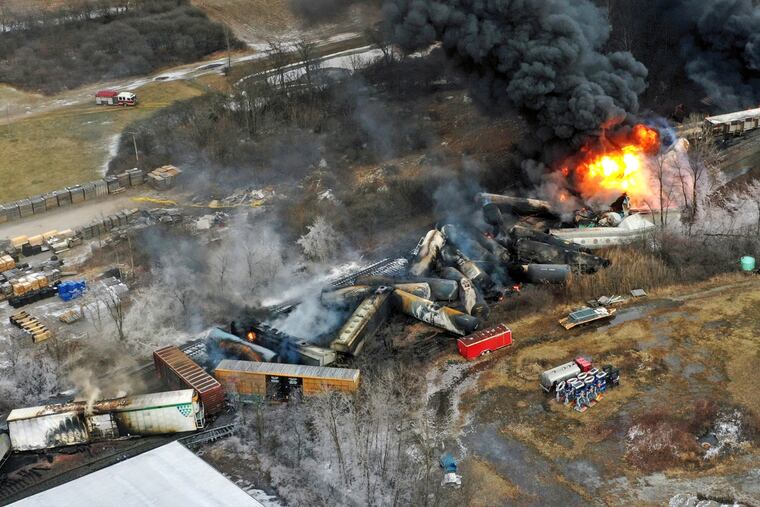The East Palestine train disaster could happen in Philly next
It’s critical Gov. Shapiro and Gov. Murphy stop projects like the Gibbstown LNG terminal that could lead to the next East Palestine-style train disaster — or worse.

February marks the second anniversary of the catastrophic East Palestine train derailment that took place near the Ohio-Pennsylvania border. Sadly, legislators and officials have done little since that derailment to address the threat posed by trains carrying dangerous and explosive cargo through our cities and neighborhoods.
Nowhere may this risk be more real than in the Philadelphia area.
This is because Eastern Pennsylvania is ground zero for at least one proposal that would green-light the transportation of massive amounts of liquefied natural gas (LNG) by train through the region. There are fewer cargos more dangerous to transport by rail. The environmental law organization Earthjustice calculates that 22 train cars carrying liquefied natural gas have the same explosion potential as an atomic bomb.
The project in question — commonly known as the Gibbstown LNG terminal — would involve the fossil fuel company New Fortress Energy liquefying natural gas in Wyalusing, Pa., and then transporting the gas by truck and train through 200 miles of Pennsylvania’s roads and railways to South Jersey, on the banks of the Delaware River across from Philadelphia. From there, it would be exported on massive tanker ships to ports overseas.
Pennsylvanians would be the guinea pigs for this first-of-its-kind project that ships volatile fuel on our roads and railways. The Gibbstown project would require hundreds of train cars to pass by tens of thousands of Pennsylvania homes, schools, and businesses every day. Since LNG is highly flammable and explosive, even a small leak during rail transport could lead to uncontrollable fires and devastating explosions, potentially injuring and killing people and destroying property up to two miles away.
Communities through which this explosive cargo would travel may have received a temporary reprieve in January when a federal court stopped LNG by freight without a special permit. Exempting the need for special permits was part of a shortsighted proposal by the first Trump administration to recklessly allow LNG by rail. In its decision, the federal court described the potential effects of an LNG rail accident as “dire, if not cataclysmic.”
However, the victory safeguarding our communities may be short-lived. Despite these risks, Chris Wright, the new U.S. energy secretary in the Trump administration (and the recent CEO of one of North America’s largest fracking companies), said during his confirmation hearing last month that “It would be hugely beneficial to Pennsylvania and to our country to have an LNG export terminal on the Pennsylvania coast.” This could signal a jump-start of this dangerous project being proposed in the Philadelphia region, putting local residents at risk.
There has been mixed leadership from the region’s governors. In 2020, then-attorney general and now-governor of Pennsylvania Josh Shapiro sued (and recently won) to stop the LNG by rail rule, saying: “Liquefied natural gas has almost never been allowed on rail cars in bulk, because it’s extremely dangerous — it’s explosive! Look, there are laws on the books to ensure safety, and the Trump administration must follow them.”
In 2020 and 2022, New Jersey Gov. Phil Murphy gave approval to begin construction of an export facility on the Gibbstown site in two votes of the Delaware River Basin Commission, but stated, “The DRBC vote was in support of upholding a dredging permit for the construction of a dock,” and that the administration “will explore all avenues within its authority to prevent the use of this dock for LNG transport.”
Maintaining this commitment is essential to the health and safety of the entire region.
It’s critical Gov. Shapiro and Gov. Murphy work aggressively to stop projects like Gibbstown that rely on the dangerous oil trains that could lead to the next East Palestine-style train disaster — or worse. They must protect communities from LNG by rail and stop the Gibbstown LNG terminal.
David Masur is the executive director of PennEnvironment. Kimberly Ong is a senior director of the Environmental Health Department at NRDC (Natural Resources Defense Council).